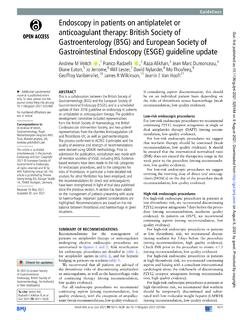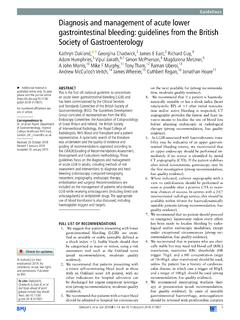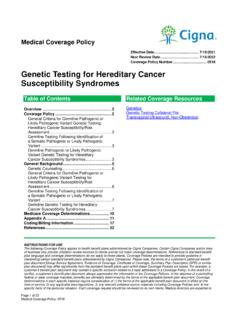Transcription of Guidelines for the management of hereditary colorectal ...
1 1 Monahan KJ, et al. Gut 2019;0:1 34. for the management of hereditary colorectal cancer from the British Society of Gastroenterology (BSG)/Association of Coloproctology of Great Britain and Ireland (ACPGBI)/United Kingdom cancer Genetics Group (UKCGG)Kevin J Monahan ,1,2 Nicola Bradshaw,3 Sunil Dolwani,4 Bianca Desouza,5 Malcolm G Dunlop,6 James E East,7,8 Mohammad Ilyas,9 Asha Kaur,10 Fiona Lalloo,11 Andrew Latchford,12 Matthew D Rutter ,13,14 Ian Tomlinson ,15,16 Huw J W Thomas,1,2 James Hill,11 hereditary CRC Guidelines eDelphi consensus groupTo cite: Monahan KJ, Bradshaw N, Dolwani S, et al. Gut Epub ahead of print: [please include Day Month Year]. Additional material is published online only. To view please visit the journal online (http:// dx.)
2 Doi. org/ 10. 1136/ gutjnl- 2019- 319915).For numbered affiliations see end of toDr Kevin J Monahan, Family cancer Clinic, St Mark s Hospital, London, HA1 3UJ, UK; k. monahan@ imperial. ac. ukReceived 20 September 2019 Revised 25 October 2019 Accepted 5 November 2019 Author(s) (or their employer(s)) 2019. Re- use permitted under CC BY- NC. No commercial re- use. See rights and permissions. Published by factors account for approximately 35% of colorectal cancer (CRC) risk, and almost 30% of the population in the UK have a family history of CRC. The quantification of an individual s lifetime risk of gastrointestinal cancer may incorporate clinical and molecular data, and depends on accurate phenotypic assessment and genetic diagnosis.
3 In turn this may facilitate targeted risk- reducing interventions, including endoscopic surveillance, preventative surgery and chemoprophylaxis, which provide opportunities for cancer prevention. This guideline is an update from the 2010 British Society of Gastroenterology/Association of Coloproctology of Great Britain and Ireland (BSG/ACPGBI) Guidelines for colorectal screening and surveillance in moderate and high- risk groups; however, this guideline is concerned specifically with people who have increased lifetime risk of CRC due to hereditary factors, including those with Lynch syndrome, polyposis or a family history of CRC. On this occasion we invited the UK cancer Genetics Group (UKCGG), a subgroup within the British Society of Genetic Medicine (BSGM), as a partner to BSG and ACPGBI in the multidisciplinary guideline development process.
4 We also invited external review through the Delphi process by members of the public as well as the steering committees of the European hereditary Tumour Group (EHTG) and the European Society of Gastrointestinal Endoscopy (ESGE). A systematic review of 10 189 publications was undertaken to develop 67 evidence and expert opinion- based recommendations for the management of hereditary CRC risk. Ten research recommendations are also prioritised to inform clinical management of people at hereditary CRC provide a clear strategy for the management of people at hereditary risk of colorectal cancer (CRC), which includes diagnosis, endoscopic management , prevention and surgical And meThOdsAn estimated 35% of CRC is due to heritable factors,1 with approximately 29% of the UK population having a family history of a first- degree relative (FDR) or second degree relative (SDR) with While highly penetrant syndromes such as Lynch syndrome (LS), familial adenomatous polyposis (FAP)
5 And other polyposis syndromes account for account for only 5 10% of all CRC diagnoses, advances in genetic diagnosis, improvements in endoscopic surgical control, and medical and lifestyle interven-tions provide opportunities for CRC prevention and effective treatment in susceptible purpose of this guideline is to provide an evidence- based framework for the optimal manage-ment of hereditary CRC for clinicians involved in their management , including gastroenterologists, nurse practitioners, physicians, colorectal surgeons, clinical geneticists, genetic counsellors and pathol-ogists. This guideline was commissioned by the Clinical Services and Standards Committee (CSSC) of the British Society of Gastroenterology (BSG), via the colorectal section, and a guideline chair selected.
6 It is an update of the previous iteration of the BSG/Association of Coloproctology of Great Britain and Ireland (ACPGBI) guideline published in 2010 and developed in accordance with the BSG National Institute for Health and Care Excellence (NICE)- compliant guideline Guideline Development Group (GDG), which included gastroenterologists from the BSG, clinical geneticists from United Kingdom cancer Genetics Group (UKCGG), colorectal surgeons from the ACPGBI, a pathologist, a genetic coun-sellor and a patient representative, was selected to ensure wide- ranging expertise across all relevant disciplines. Members of the GDG, and participants in the eDelphi process, completed a Declaration of Conflict of Interests (COI) form which was reviewed and vetted by the scoping meeting was held on 13 October 2017, and in advance of this meeting the GDG was asked to develop key priorities and GDG determined that the primary measure of effectiveness of any intervention was a reduc-tion of the lifetime risk of CRC, and the following secondary outcome measures: on November 30, 2019 by guest.
7 Protected by : first published as on 28 November 2019. Downloaded from 2 Monahan KJ, et al. Gut 2019;0:1 34. Reduction in the incidence of advanced adenomas at colonoscopyii. Prevention of CRCiii. Reduced morbidity related to CRC, or morbidity secondary to complications of surveillance and treatmentiv. Improved identification of hereditary CRC syndromesv. Improved pathways from diagnosis to treatment in suscep-tible sought a consistent approach in our assessment of the rela-tive effectiveness of interventions. In principle we agreed that surveillance should only be offered to individuals who remain at higher risk of developing CRC than the general population. As CRC risk is not always clearly defined, as a surrogate we accepted that advanced adenoma yield on surveillance should be approximately double that in susceptible populations compared with the average risk relative threshold for genetic testing was agreed for people with a 10% or greater probability of having a germline patho-genic variant in a cancer susceptibility gene in accordance with previous UK 4 However the GDG agreed that the arbitrary nature of this threshold meant that it could be modified in cases where objective risk assessment was difficult to attain, and clinicians had sufficient clinical suspicion of questions we sought to cover included the following:1.
8 Which aspects of the previous Guidelines require updating?2. What is the lifetime CRC risk and optimal surveillance for those with a family history of CRC (where LS and polyposis syndromes have been excluded)?3. What is the diagnostic yield of genetic testing and/or sur-veillance for high- risk populations?4. What is the optimal gastrointestinal (GI) surveillance for pa-tients at hereditary risk GI cancer ?5. What is the impact of high- quality endoscopy in patients with known or suspected hereditary cancer syndromes?6. Should we develop gene- or gender- specific Guidelines for surveillance?7. What is the optimal diagnostic assessment and surveillance interval for Lynch- like syndrome patients?8. How can we improve recognition, diagnosis and treatment of patients at hereditary risk of CRC?
9 9. Which diagnostic genetic tests should we offer serrated polyposis syndrome (SPS), multiple colorectal adenoma (MCRA) and early onset CRC (EOCRC) patients (if any)?10. When should colonoscopic surveillance for familial risk patients stop, because it is no longer necessary, or because the patient should be referred for surgery?11. Which are the optimal surgical approaches in patients with hereditary CRC syndromes?12. What is the evidence for chemoprophylaxis in patients who are at hereditary risk of CRC?13. What is the evidence for the effect of lifestyle modification on hereditary risk of CRC?14. What information do we need to share with our patients at inherited risk of GI cancer ?Twenty- three PICOs (Patients, Interventions, Controls and Outcomes) were developed which considered these questions.
10 The Appraisal of Guidelines for Research and Evaluation (AGREE II) instrument provided a methodological literature search was commissioned externally, with search strategies agreed, and was performed by the Yorkshire Health-care Consortium, which returned 10 189 publications. Returned abstracts were reviewed for relevance. Additional references were obtained by cross- referencing and by recommendation from the GDG. Relevant published national and international Guidelines were also scrutinised. After each round of Delphi, and before the guideline was finalised, the search was repeated and any important studies published since the initial evidence search were modified electronic Delphi process6 was used to develop and refine statements.










